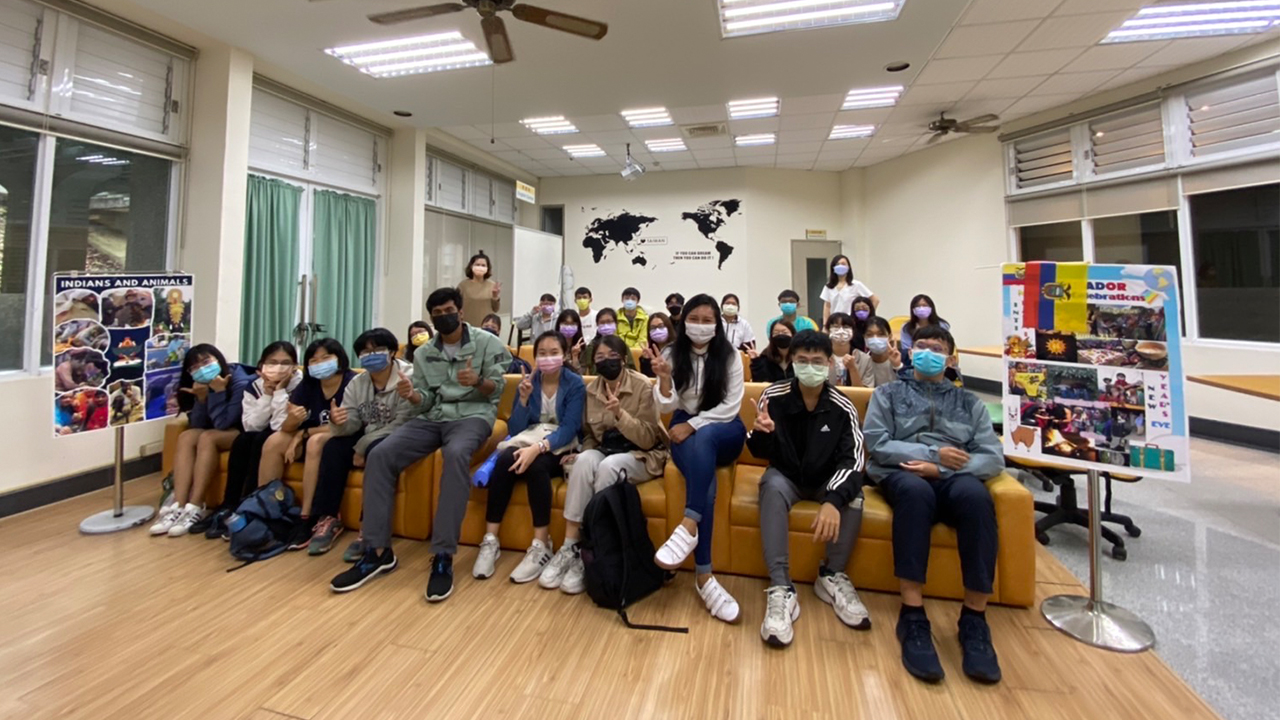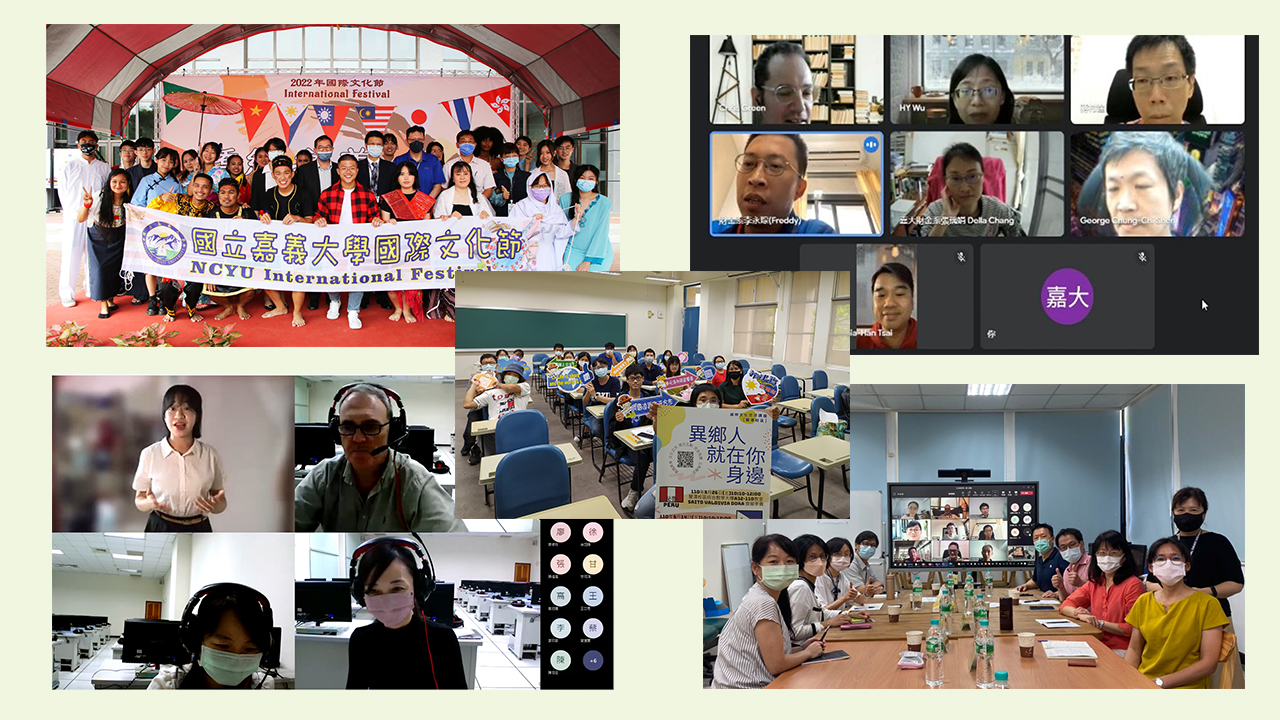Abstract
In order to encourage and promote bilingualism, National Chiayi University (NCYU) has proposed and undertaken a project subsidized by the Ministry of Education. In the proposal, we outlined the following goals: 1. setting up a committee to strengthen connections within our organization, creating an integrated knowledge-and-skill learning environment; 2. providing teaching support; 3. establishing learning-oriented evaluation and self-learning systems to improve students’ English competence; 4. taking measures to enhance the quality of EMI curricula; and 5. sharing resources for interscholastic collaboration.
Over the past year, administrative and academic units at NCYU have worked together on the EMI project to improve English education, and the NCYU bilingual policy has been adjusted to go with the project. The "NCYU Bilingual Education Initiative Committee" was established and convened by our Senior Vice President. The Office of Academic Affairs and the Language Center were responsible for the educational administration across the seven colleges at NCYU. For students at different levels, NCYU provided abundant learning resources, such as remedial teaching and English proficiency assessment. For teachers, NCYU facilitated them with EMI teaching support, and certificates in online EMI skills courses. .
Several measures were taken for students at NCYU: (1) On admission, students at different proficiency levels were assigned to either basic or advanced Freshman English classes ( For learning effectiveness, students were allowed to switch to a class at another level, if appropriate). (2) NCYU administrated Freshman English Competency Tests to track the freshmen’s listening and reading performance, and rewarded those who made significant progress. (3) NCYU augmented Freshman English classes by offering a 6-hour after-school self-learning program.The audio-visual interactive online resources on the EASY TEST platform were used in support of self-learning to hone students' listening and speaking skills, while online English magazines were used to strengthen students' reading ability. (4) Elective “Sophomore English” included ESAP (English for Specific Academic Purposes) and ESP (English for Specific Purposes) courses, mainly focusing on more pragmatic and communicative aspects of English. ESAP--Technical English, English for Agriculture and Life, and Workplace English courses were college-exclusive. ESP--News English, Intercultural Communication, Tourism English, and Introduction to English Picture Book courses--were accessible to all students. (5) NCYU also hosted various competitions, such as the online real-time speaking competition and writing competition, and provided monetary awards in order to encourage student participation. To maximize teachers’ and students’ language output , the Language Center invited students and faculty to participate in various activities (e.g., Online Chat with Native-Speaking Teachers, English Cafe, International Week) to improve their speaking ability. In addition, the Language Center also conducted Freshman English Tests to track students’ writing progress. (6) With the project funds, additional online learning resources--IELTS, X-reading, Live Culture, and CNN courses-- were purchased to provide students with more diversified choices to develop their autonomous-learning habits and improve learning outcomes. Hopefully, students have achieved higher competence in English after exposure to these English courses training during the first two years.
To motivate and encourage faculty, our measures included: (1) establishing and revising the "Incentive Scheme for EMI Courses at National Chiayi University" to set up EMI guidelines, eligibility criteria, and the process of applying for teaching EMI-based courses, while providing subsidies for teachers and departments as incentive. Teachers who were subsidized need to follow specific Key Performance Indexes to increase instructional quality; (2) In order to motivate teachers to deliver courses in English, EMI course subsidies were increased by 150%. To help students integrate and take in EMI course content as well as enhance EMI teaching and learning effectiveness, the "remedial teaching for ESP" subsidy was increased by 50% per hour; (3) The subsidy for EMI teachers was 10,000 NTD for one EMI course and 5,000 NTD for the department; (4) Certificate in EMI Skills by Cambridge was purchased as an online self-study course to provide assistance for teachers in preparation for EMI courses. In 2022, a total of 54 teachers participated; (5) Speeches and workshops were held to support teachers; (6) College-exclusive online chats with foreign teachers were held for EMI teachers; (7) EMI teachers and teachers accomplishing the course “Certificate in EMI Skills by Cambridge” were invited to share their EMI teaching & learning experiences; (8) Flyers related to EMI activities from any other higher education institutes were announced. In brief, NCYU has taken measures to empower teachers when they initiated new EMI courses.
To establish a more bilingual campus, many activities were held to expand local internationalization. For example, master lectures and workshops were held to boost students’ skills to connect with international communities, including cross-cultural communication, social skills, and an understanding of international development trends. International cultural festivals, which introduced students to different cultures, were held to acculturate international students and help our domestic students to appreciate the diversity and homogeneity of different cultures and other countries. Students can learn English in a diverse and interesting way by getting involved in various international cultural activities and lectures, meeting international companions for learning and language exchange partners, and joining in English Cafe. Eventually, we created a friendly, internationalized environment for the students to join.
To increase course quality, the latest course evaluation of a teacher prior to his/her application for an EMI course must reach at least 3.5 points . EMI course syllabi must be offered in both English and Chinese. During the semester, EMI courses shall be filmed or relevant video clips shall be produced and then uploaded to the LMS/e-learning platform for students to review after class. By the end of the semester, EMI teaching experience and suggestions shall be offered as references for further promoting EMI on campus. For information disclosure and resource sharing, the website "Bilingual Education Initiative Committee"(https://reurl.cc/kl6ReG) was constructed to present EMI information at NCYU and from other universities. Simultaneously, emails were sent to all departments to notify all teachers about the EMI workshops/speeches.
In order to strengthen our students’ English competence and administer the EMI incentive scheme, “NCYU Bilingual Education Initiative Committee” held management meetings to assess the implementation of the EMI project. The meetings were convened on a monthly basis by our Senior Vice President with the following members: Vice President for Academic Affairs, Language Center Director, and Associate Vice President for Academic Affairs, and all the College Deans. The meetings were aimed to monitor progress of the project and appropriate use of the funds. The members of the management meeting gave suggestions to orient or revise the implementation of the EMI project.
The project has been carried out for the 1st year and found to be quite beneficial. However, there is still room for improvement. Hopefully, NCYU students and teachers will benefit more in the future and will continue to improve their proficiency levels of general and academic English.

